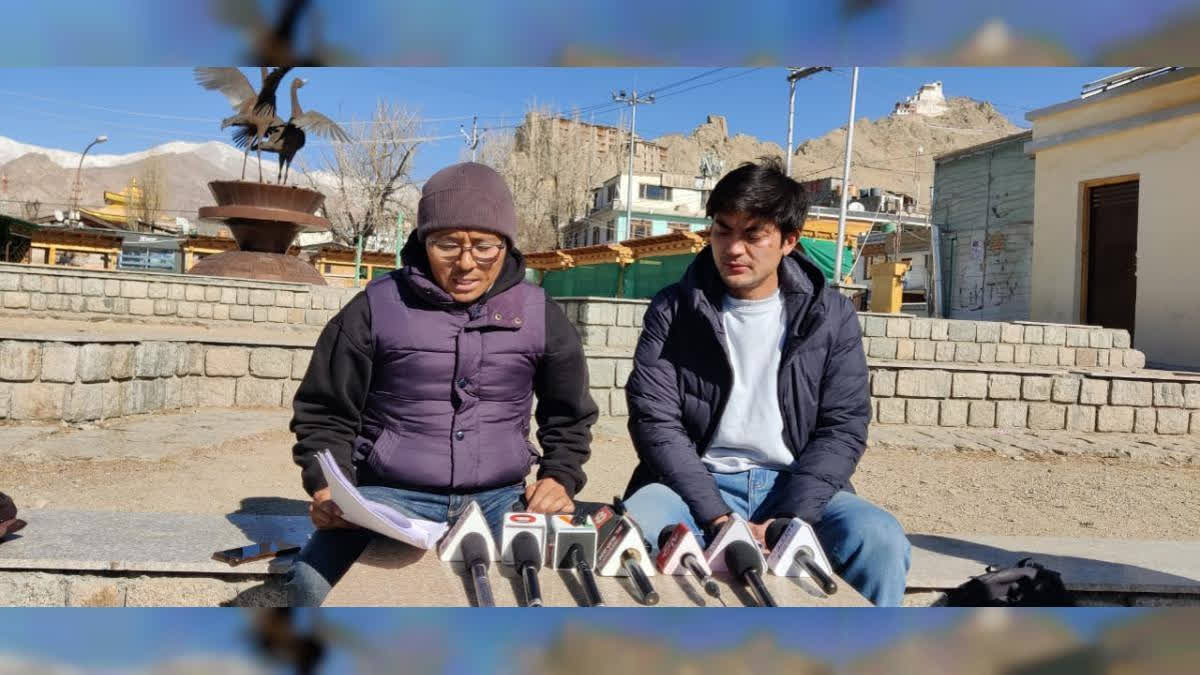Leh: The unemployed youth in Ladakh have sought clarity on domicile and EWS reservation following the talks between the high-power committee and the Ministry of Home Affairs (MHA).
Sonam Dawa, a gazetted aspirant told reporters, "After the January 15 meeting of the High Power Committee with the MHA, there is confusion among the youth regarding domicile and EWS reservation."
He said that on October 30, they had held a meeting with the Hill Council in the presence of members of the apex, religious organisations and stakeholders.
"During the meeting, there was a unanimous agreement on the need for a domicile for Ladakh, as all states in India have their own domicile policies, such as those in West Bengal, Sikkim, and Himachal Pradesh. Until recently, we have been relying on the LRC, which is a temporary measure. If a domicile policy like that of Jammu & Kashmir is introduced in Ladakh, it would not be suitable for us. We prefer a domicile policy similar to Sikkim, with a clearly defined cut-off date," Dawa added.
"During the January 15 meeting, they proposed a 15-year domicile, but only for jobs. However, we have seen an example with the Ladakh Resident Certificate (LRC), which was initially meant only for jobs but later extended to Aadhaar updates, ration cards, and other purposes.
"When the government says that the 15-year domicile is only for jobs, it raises doubts. Will there be a separate domicile for ration cards, scholarships, and other services? So far, in India, we haven’t seen a state with two different domicile systems. There is a genuine fear that this same domicile might eventually be extended to other areas as well. This is a critical issue that requires attention. We hope that the upcoming talks in February will include a thorough discussion on domicile," said Dawa.
According to Phuntsog Targais, another gazetted aspirant, unemployed youth are not questioning the accountability, selflessness, dedication, or efficiency of their leaders.
"It is because of their efforts that Ladakh has been protected, granted a Hill Council, and given Scheduled Tribe status," said Targais.
About reservations, Phuntsog said, “When talks with the Centre resumed, they announced a 95% reservation, which was widely celebrated. However, the full 95% cannot be entirely availed by Ladakhis, as 80% is reserved for STs, 1% for SCs, 4% for ALCs, 10% for EWS, and 5% for UR."
"There is a lot of misinformation circulating on social media claiming that an ST candidate can also apply under the EWS category, which is completely false. According to the 103rd Constitutional Amendment, as clarified by the Supreme Court, the EWS reservation is exclusively for the general category candidates whose financial conditions are not well. This means that if a candidate applies under another category, they cannot simultaneously apply under EWS," Phuntsog added.
Phuntsog further said, "As per the National Commission for Scheduled Tribes, over 97% of Ladakh’s population belongs to the ST category. Yet, only 80% of the reservations are allocated to STs, while 15% is reserved for the remaining 3% of the open category which does not seem justified. The numbers don’t add up, and this is a matter of serious concern."
According to Phuntsog, in the past, during SSC recruitments, it was observed that there were very few EWS candidates in Ladakh.
"As a result, many seats at the subordinate level went unfilled. Eventually, it became evident that the EWS category in Ladakh is quite small. This not only leads to wasted seats but also opens the door for unreserved candidates from across India to apply for these jobs, potentially disadvantaging the local population”, stressed Phuntsog.
He said their final concern was about the issuing authority. "If a domicile is introduced, the question arises, who will be responsible for issuing the EWS certificates? We strongly recommend that the issuing authority be elevated to the level of the Deputy Commissioner. This will minimise the potential for corruption and ensure greater transparency in the process," Phuntsog added.
According to Phuntsog, the lack of availability of the minutes from the meeting is creating significant confusion among the people.
He urged the Centre, the Council, and the leaders to make the minutes of the meeting accessible, which would help bring much-needed clarity.
"Regarding the 15-year domicile policy—if a person resides in Ladakh for 15 years, they can become a domicile of Ladakh. Does this not essentially open the gates for non-Ladakhis to come and apply for jobs in Ladakh? Once they obtain domicile status, won’t they also become eligible to buy land and establish businesses here? Gradually, this could pave the way for an influx of non-Ladakhis, ultimately leading to a change in Ladakh’s demographic profile. This is a matter of grave concern that requires immediate attention," said Phuntsog.
"Although this is the duty of the Councillors, it has been almost five years since we attained UT status, yet none of the Councillors from either Leh or Kargil have addressed these critical issues. What do the Councillors have to say about safeguards, job security, and protection for the people of Ladakh? You are elected representatives, and you are paid to serve the people. Please be reasonable with the responsibility entrusted to you and accountable to the people of Ladakh. It is due to the incompetence of the Councillors that we are compelled to raise these issues ourselves," he concluded.
